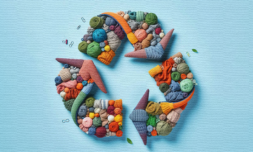The high street giant is taking steps to ‘boost supply chain transparency with new sustainability rules’.
According to reports, British supermarket Tesco is introducing digital ‘passports’ for all of its clothing products.
With a simple scan of a QR code printed on each item, users can access detailed information about a product’s materials, manufacturing process, and – most importantly – environmental impact.
The initiative arrives as the EU prepares to crack down on greenwashing, holding companies to stricter standards when making sustainability claims. Tesco’s decision positions it as an early adopter of this transparency push, potentially setting a new benchmark in the fashion industry.
But, is this genuine progress or just sophisticated marketing?
Digital product passports (DPPs) are set to be rolled out across different industries over the next eight years, and will enable brands to give customers more visibility on materials and their environmental impact.
Tesco is hardly the first company to introduce this kind of offering, however. Sustainable companies like jewellery designer Monica Vinader first introduced a DPP in 2022, allowing consumers to trace the journey of its pieces across the entire supply chain.
Tesco is trialling digital product passports for its F&F Clothing line, offering customers sourcing and sustainability details.
This move, in partnership with Fabacus, addresses upcoming regulations on greenwashing and unsustainable practices. pic.twitter.com/glhNHqUzoY
— Darko Pavic (@PavicDarko) August 29, 2024
And a survey from earlier this year found that luxury consumers are also demanding more transparency from brands. According to Vogue, those surveyed expressed a desire to learn about a product’s materials and authenticity – particularly when it came to handbags, watches, and jewellery.
30% of people expected brands like Gucci, Hermès, Prada, Dior and Louis Vuitton to offer DPPs, suggesting that customers are not only willing, but eager to begin adopting this kind of technology.
Tesco is, however, one of the first high street brands to launch this sustainable mechanic – and certainly one of the first supermarket chains.
The retail giant’s new strategy offers consumers a closer look at how their clothes are made, including insights into sourcing and environmental footprints. The hope is that informed customers will make more sustainable choices, prompting suppliers to adopt greener practices.
Given that fashion is responsible for about 10% of global carbon emissions and generates vast quantities of waste, such transparency could drive change in an industry that has been slow to clean up its environmental record.
However, the decision isn’t all down to Tesco itself. Alongside DPPs, new requirements under EU legislation will determine how retailers manage their stock, including a ban on unsold clothes. Firms that fail to follow the rules will receive fines and may be barred from selling products across the EU.
Andrew Xeni, founder of the eco-friendly fashion label Nobody’s Child, which has already tested DPPs after launching them in March, said: ‘What they’re doing is, in essence, saying consumers would have the right and access to a level of information that enables them to make an informed buying decision, so they’re aware of the environmental impact of the product that they’re buying.’




















